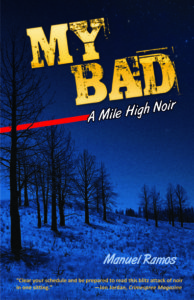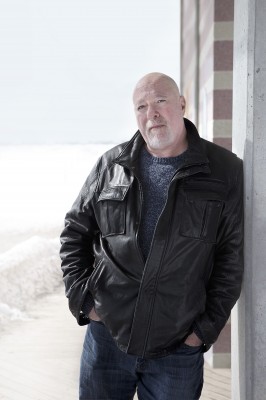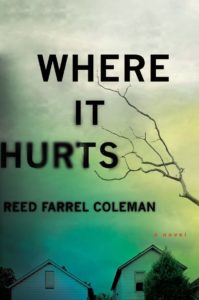Today on Legal Eagles, I’m featuring a crime author who also happens to be a fellow alumnus from the University of Colorado, School of Law. Manuel Ramos. I had the pleasure of speaking with Manuel recently at the Mysterious Bookshop, at an event to meet and greet the new board members of the Mystery Writers of America. Click here for a blog piece Manuel wrote about his new status on the national board.
As Manuel makes clear in his blog post, he is one of very few published Latino authors of crime fiction. I would venture to guess that he is also one of the few Latino crime writers with the distinction of having a highly successful law career, which included years of award-winning public service for Colorado Legal Services. He is now retired from the law.
At the Mysterious Bookshop, I picked up a copy of his latest novel, My Bad. I’m glad I did.

My Bad, by Manuel Ramos (Arte Publico Press)
Many reviewers have written of Manuel’s talent for spare and vivid prose, bringing to life Denver’s Chicano culture and changing neighborhoods. I would add to these accolades that his legal background makes a significant contribution to his work. Those of you who’ve read the Dana Hargrove legal thrillers know of my interest in exploring the ethical dilemmas facing attorneys in the field of criminal law. Manuel enhances his work with plenty of them. How’s this one for a doozy? An ex-con employee of a criminal defense lawyer, tailing a client to investigate a civil lawsuit, unwittingly finds himself at the scene of a murder that implicates the client. Should the attorney report it or keep it quiet? What an impossible tug of competing loyalties! A dilemma of choice among the ethical duties owed in multiple capacities: as lawyer, friend, employer, and citizen. I love this stuff!
Subtitled “A Mile High Noir” in a nod to the mile-high Rocky Mountain city, My Bad is just as much a story of the relationship between attorney Luis Móntez and ex-con Gus Corral, as it is a plot-driven crime drama. Gus is adjusting to life on the outside after serving an unspecified number of years in prison for unspecified crimes. Under the watchful eye of his parole officer, Gus is perpetually on edge, second-guessing every step he makes for possible repercussions to his parole status. The legal mess that landed Gus in prison is the subject of a previous novel. Click here to watch a very cool video about the first Gus Corral novel, Desperado. I haven’t read Desperado, but am now driven to read it, to find out more about Gus. Like my Dana Hargrove novels, Manuel’s books are standalone and can be picked up in any order.
My Bad gives a real sense of place and community in its descriptions of city streets and buildings, Mexican food, family gatherings, social events, and references to music, mostly rhythm and blues. The author also sprinkles in a good number of phrases and words in Spanish. Porque lo entiendo un poquito this was not a problem for me, nor would it pose an obstacle for readers who don’t understand the language. The meaning is clear (or close enough to clear) from context, and you’ll enjoy the flavor that the dialog gives to scene and exposition.
In fiction, I appreciate creativity with language, mood, and scene, and you’ll get a lot of that here. The language is terse and, in some places, tough, but not so very tough. I’m a fan of suggestion, innuendo, clever twists, and leaving a lot to the intelligence of the reader—not a fan of graphic violence, blood and guts, or gratuitous cursing. This novel falls in place with these tastes. The characters are human, flawed, a mix of good and bad, their personal challenges relatable. For example, there’s a good deal of angst expressed by Luis Móntez as he prepares to wind down his law practice and retire, reflecting on his professional and personal life, attempting to come to terms. Does this sound familiar to me? Perhaps so. I won’t go into detail.
I enjoyed this novel and look forward to reading more. Check out Manuel’s website for descriptions of all his works.


